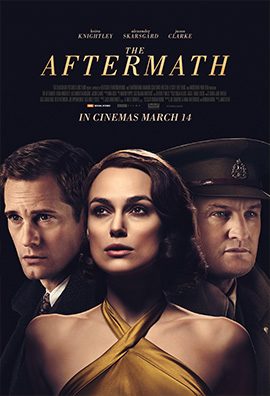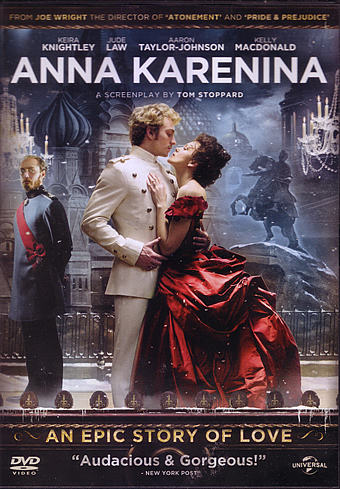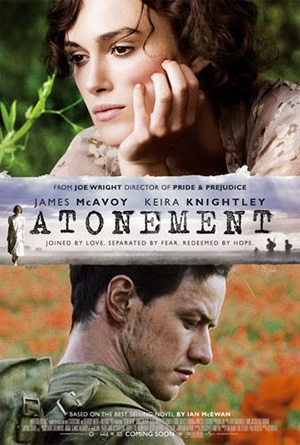THE AFTERMATH (2019)
Genre: Drama/ Romance/ War
Director: James Kent
Cast: Keira Knightley, Alexander Skarsgård, Jason Clarke
Runtime: 1 hr 49 mins
Rating: R21 (Sexual Scenes)
Released By: Fox
Official Website:
Opening Day: 14 March 2019
Synopsis: Set in postwar Germany in 1946, Rachael Morgan (Keira Knightley) arrives in the ruins of Hamburg in the bitter winter, to be reunited with her husband Lewis (Jason Clarke), a British colonel charged with rebuilding the shattered city. But as they set off for their new home, Rachael is stunned to discover that Lewis has made an unexpected decision: They will be sharing the grand house with its previous owners, a German widower (Alexander Skarsgård) and his troubled daughter. In this charged atmosphere, enmity and grief give way to passion and betrayal.
Movie Review:
Had ‘The Aftermath’ been released many years earlier, it would probably have been Oscar-worthy material not unlike ‘The English Patient’, ‘Atonement’ and ‘A Very Long Engagement’; but given Hollywood’s overwhelmingly singular obsession with diversity, such love-in-wartime dramas no longer seem to be in vogue. Even so, we suspect this post-World War II romance between the wife of an American general and the German architect whose house they are temporarily staying in will find its appeal with mature audiences looking for an undemanding time in the cinema.
Based on the 2013 bestseller by Rhidian Brook, the story paints its female protagonist Rachel (Keira Knightley) as an emotionally brittle woman who has yet to fully overcome the loss of their young son some years ago in London. She arrives a few months after the Allied victory to join her husband Colonel Lewis Morgan (Jason Clarke) in Hamburg for the post-war settlement effort, and the couple put up in a beautiful villa belonging to Stephan Lubert (Alexander Skarsgard) which the British army had requisitioned. Rather than send Stephan and his teenage daughter Freda (Flora Thiemann) to a camp, Lewis graciously offers to let them stay in the attic, an arrangement which Rachel is initially deeply uncomfortable with.
There is good reason for both Rachel and Stephan to distrust each other at the start – while the Germans had dropped the bomb which killed Rachel’s son, the Allies were responsible for the bombing which claimed the life of Stephan’s wife. Their mistrust is portrayed with nuance in a couple of nicely choreographed scenes in the first act, including one where she sneers at his chic modernist chair in the living room and another where she accuses him of not being honest about the picture of Hitler which used to be hanging in the living room.
Just as sensitively depicted is the resentment which Rachel holds of Lewis, begrudging him for seemingly overcoming the death of their son too easily. While it would have been convenient to reduce their relationship to that, the film makes it clear through their mutual exchanges that both Lewis and Rachel still love each other dearly. And in doing so, director James Kent conveys a compelling message about the destructive nature of grief, which can not only cloud our basic humanity but also tear us away from the ones closest to us.
As you probably can guess, this is the aftermath which the title of the film refers to, the consequences of a devastating war which has left ordinary people on both sides picking up the pieces of their lives before. But there is yet another aftermath to be told, which follows from the illicit romance between Rachel and Stephan as they see in each other kindred souls wounded by the war. Both Knightley and Skarsgard seem aware of how easy it would be to scoff at the attraction between their respective characters, and in turn display extraordinary care balancing restraint and passion in their subsequent scenes together. Thanks to them, as well as Kent’s deft handling of the material, their relationship never at any point reduces itself to caricature.
Any book-to-screen adaptation would have needed to trim some of the plotting in the former away, and this is no different. Whereas those who have never read the book would not have guessed that the Morgans have a second living son, it is quite obvious that a subplot involving Freda’s seduction by a Nazi guerrilla fighter (Jannik Schümann) receives short shrift in the film. Seeing as how the said fighter plays a pivotal role in the denouement, the narrative could certainly have benefitted with a fuller treatment of their teenage courtship – which in turn would also have kept more of the post-war context in the foreground, even as the focus shifts to the events leading up to the second aftermath we earlier described.
Even so, whether Rachel chooses to stay with Lewis or leave with Stephan isn’t that difficult to guess, but the treatment here of what could have been mopey and melodramatic makes all the difference. Instead of going histrionic, Lewis remains a dignified presence all the way through, and Clarke brings gravitas to his character that has surprising depths of emotion. Without giving it away, let’s just say that the conclusion is undeniably moving, and brings the film back to its most gripping theme of how people move on from tragedy.
As far as love-in-wartime dramas go, ‘The Aftermath’ is elegant enough to endear itself with mature audiences looking for some cathartic viewing. It packs a poignant message about the emotional toll of war, as well as the consequences of our choices when we seek refuge rather than reconciliation, without ever being moralistic or didactic. Certainly, it doesn’t hurt having Knightley and Skarsgard as the pair of illicit lovers – not just because they are easy to look at, but also because both exude palpable sexual chemistry next to each other; neither for that matter does it hurt to have a solid character actor like Clarke complete the romantic triangle. And with the gloss of tasteful prestige fare and the sumptuousness of a period drama, it surely is ravishing in more ways than one.
Movie Rating:




(What could have been mopey and melodramatic is instead handled with restraint and nuance, and played with genuine emotion by the stars, such that this love-in-wartime drama brims with poignancy and poise)
Review by Gabriel Chong
You might also like:



.jpg)

